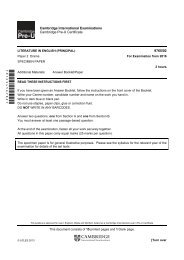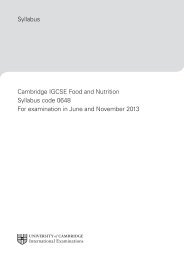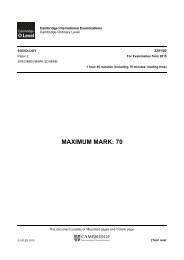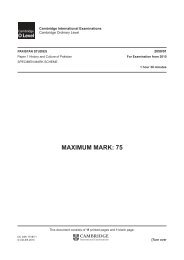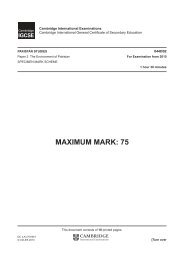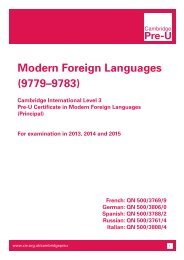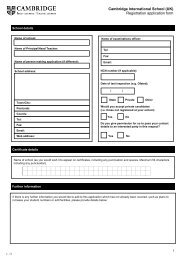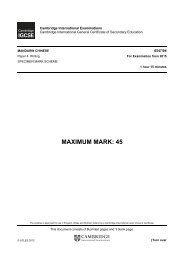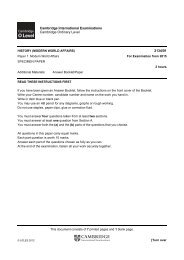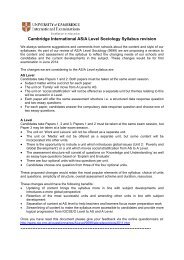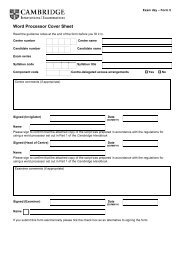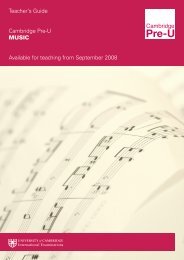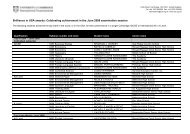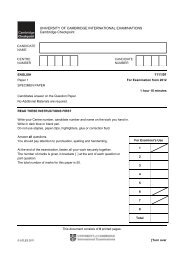Cambridge Pre-U Syllabus - Cambridge International Examinations
Cambridge Pre-U Syllabus - Cambridge International Examinations
Cambridge Pre-U Syllabus - Cambridge International Examinations
Create successful ePaper yourself
Turn your PDF publications into a flip-book with our unique Google optimized e-Paper software.
66<br />
<strong>Cambridge</strong> <strong>Pre</strong>-U Draft<br />
Glossary of terms used in Biology papers<br />
It is hoped that the glossary (which is relevant only to Biology) will prove helpful to candidates as a guide,<br />
although it does not cover every command word that might be used in Biology examinations. The glossary<br />
has been deliberately kept brief not only with respect to the number of terms included but also to the<br />
descriptions of their meanings. Candidates should appreciate that the meaning of a term must depend in<br />
part on its context.<br />
1. Define (the term(s)…) is intended literally, only a formal statement or equivalent paraphrase being<br />
required.<br />
2. What do you understand by/What is meant by (the term(s)…) normally implies that a definition should<br />
be given, together with some relevant comment on the significance or context of the term(s) concerned,<br />
especially where two or more terms are included in the question. The amount of supplementary<br />
comment intended should be interpreted in the light of the indicated mark value.<br />
3. State implies a concise answer with little or no supporting argument, e.g. a numerical answer that can<br />
readily be obtained ‘by inspection’.<br />
4. List requires a number of points, generally each of one word, with no elaboration. Where a given<br />
number of points is specified, this should not be exceeded.<br />
5. (a) Explain may imply reasoning or some reference to theory, depending on the context. It is another<br />
way of asking candidates to give reasons. The candidate needs to leave the examiner in no doubt<br />
why something happens.<br />
Explain how indicates that the candidate should show the way that something works. Explain why<br />
indicates that the candidate should give the reasons why an event, process or outcome occurs;<br />
that the candidate should show what causes the system to do what it does.<br />
(b) Give a reason/Give reasons is another way of asking candidates to explain why something<br />
happens.<br />
6. (a) Describe, the data or information given in a graph, table or diagram, requires the candidate to state<br />
the key points that can be seen in the stimulus material. Where possible, reference should be<br />
made to numbers drawn from the stimulus material.<br />
(b) Describe, a process, requires the candidate to give a step by step written statement of what<br />
happens during the process. Describe and explain may be coupled, as may state and explain.<br />
7. Discuss requires the candidate to give a critical account of the points involved in the topic. This may<br />
include considering the issues, giving information to build an argument, or to permit weighing of both<br />
sides of an argument.<br />
8. Comment is intended as an open-ended instruction, prompting candidates to make responses<br />
appropriate to the context of the question. This may involve evaluating a statement or a hypothesis and<br />
is often asked in the context data analysis where evaluation of a procedure and/or assessing the quality<br />
of data is expected. Thus candidates may wish to describe, explain, analyse and/or evaluate in<br />
response to this command word.<br />
9. Outline implies that only the essential points are required, without any supporting detail.<br />
10. <strong>Pre</strong>dict implies that the candidate is not expected to produce the required answer by recall but by<br />
making a logical connection between other pieces of information. Such information may be wholly given<br />
in the question or may depend on answers extracted in an earlier part of the question.<br />
<strong>Pre</strong>dict also implies a concise answer, with no supporting statement required.<br />
11. Deduce is used in a similar way to predict except that some supporting statement is required, e.g.<br />
reference to a law or principle, or the necessary reasoning is to be included in the answer.<br />
In multiple choice questions, deduce is used to mean that candidates should use the information<br />
presented in the question plus their own skills, knowledge and understanding from across the biology<br />
syllabus to solve the problem or problems required in order to answer the question.



